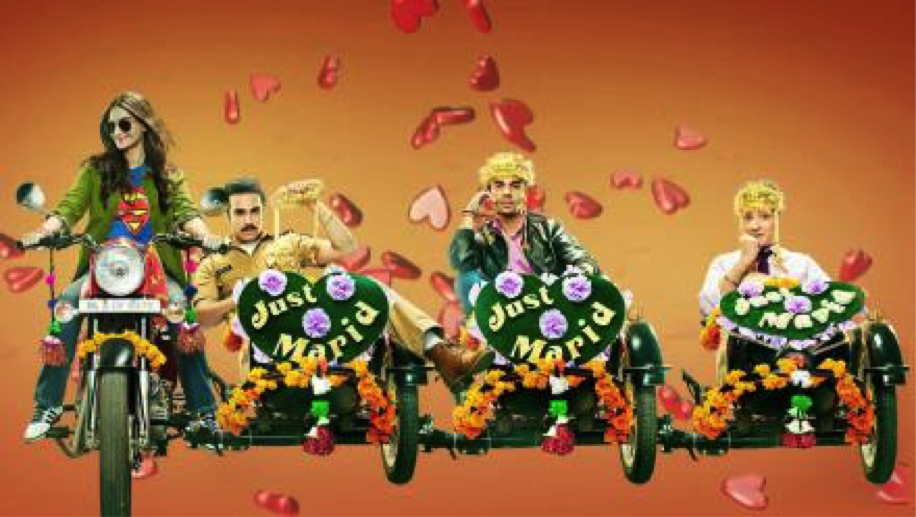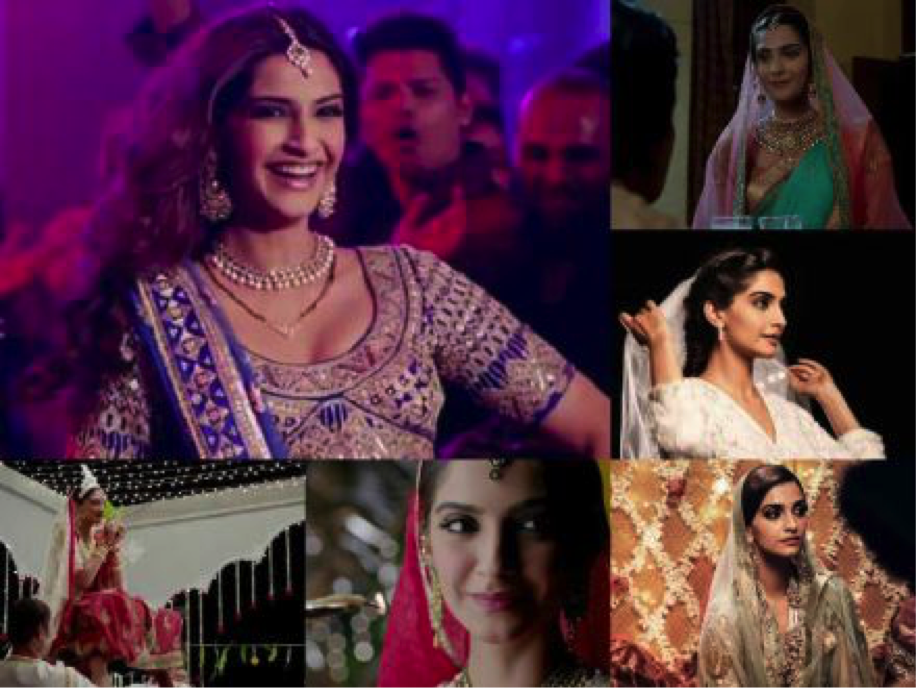Aishwarya Subramanian
Rating: 3.5 stars
Watching the trailer of Dolly Ki Doli reminded me of Bollywood films with similar plots, like Bunty Aur Babli, Bobby Jasoos, and Daawat-e-Ishq. All of these movies star powerful lead actresses that steal the show. So naturally expectations were pretty high for this Arbaaz Khan production. Thanks to the whole team of Dolly Ki Doli and debutant director Abhishek Dogra, the film more-or-less lived up to these relatively high expectations.
Dolly (Sonam Kapoor), along with her group of fake family members, traps grooms looking for brides by making them fall in love with her, marrying them, and fleeing with their valuables after the wedding. A few of her persistent grooms who were left after the altar, including Sonu (Rajkummar Rao) and Manjot (Varun Sharma), are determined to find her and turn her over to Robin Singh (Pulkit Samrat), the police inspector in charge of catching this “looteri dulhan”.
Unlike many latest Bollywood films of similar genre, Dolly Ki Doli implicitly reveals and challenges important ideas related to the concept of marriage in India, including dowry, expectations from and dominance over newly-wed brides by a domineering mother-in-law, and patriarchy in general. For example, the two main grooms’ mothers are highly over-controlling and greedy, as they ask Dolly to keep her jewelry with them in order to have and control all of the bride’s possessions. Similarly, during a wedding scene, Manjot’s mother (Archana Puran Singh) complains that Dolly, her new daughter-in-law, drinks alcohol and dances “too wildly”, characteristics that are unwanted for the ideal Indian bahu. But ultimately, these expectations cease to matter because not only does Dolly end up marrying the groom (against the parents’ wishes), she also robs the groom’s family of all their precious belongings.

While the filmmakers strive to break away from traditional ideas related to marriage and expectations of brides, there is still an unnecessary item number that contradicts the film’s social commentary. Interestingly enough, it’s the very first song of the movie and is performed by Malaika Arora Khan at one of Dolly’s weddings. A word of caution to Arbaaz Khan, avoid featuring your wife in an item number in every film that you produce. Although the item song, intelligently placed within the first 30 minutes, doesn’t really erase the sentiments in the latter part of the story, it definitely makes viewers question whether wedding receptions in India actually present such inappropriate “entertainment”. At the same time, as a dancer, I must comment on the perfection of Remo D’Souza’s choreography and the execution of it by Malaika, Rajkummar Rao (whose energy, enthusiasm, and dance skills are surprisingly on-point), and the background dancers.
Something that was indirectly hinted at multiple times but never explicitly mentioned in the film is the idea of physical intimacy as a commodity that is traditionally demanded by men from women in Indian society. Fortunately or unfortunately, the word “sex” is not mentioned once in the film, either out of fear of being too forward and inappropriate a movie for children or because Indian audiences are still hesitant to publicly broach the topic in commercial cinema. Nevertheless, the ambiguity that results from not explicitly saying the word but still knowing what people are talking about through facial expressions makes certain scenes more comedic and adds to the flavor and chemistry between the characters. With regards to sexual consent, surprisingly and thankfully the director does a good job of portraying it, as most of Dolly’s grooms have the decency to ask for her consent on their first night together after the wedding. Naturally, after every wedding, Dolly’s answer is always no, and she creates excuses like “ladkiyon wala problem” (implying menstruation, another topic of taboo in Indian culture).
Although the only high-profile star of Dolly Ki Doli in terms of casting is Sonam Kapoor, Rajkummar Rao easily steals the show. His character, Sonu, has an angry young man demeanor, which he effortlessly showcases throughout the film, especially in one scene where he poses the same expression in conversation with Manjot about their interactions with Dolly. Needless to say, since she’s the only heroine of the film, Sonam pulls off Dolly’s role with ease and charm, even though screenplay-wise there are a few gaps in her character development, including her repeated success with conning while using the same name. Of course, Sonam is no Rani Mukerji from Bunty Aur Babli but she certainly flaunts Dolly’s bridal status with beautiful lehengas and suits designed by Anupamaa Dayal. Standalone, Sajid-Wajid’s music is average but it fits well in the context of the film’s situations. Saif Ali Khan’s special appearance as a Prince is a short but sweet cameo that tries to connect loose threads in the plot.
Final Verdict: Dolly Ki Doli is a cute romantic-comedy entertainer that definitely sustains audience attention for its short length. Though the unexpected twists and turns in the plot, especially in the latter half, are pleasant surprises, there are certain scenes that pale in comparison. Nevertheless, the plot’s resolution leaves viewers feeling strong, rebellious, and fiercely independent!




